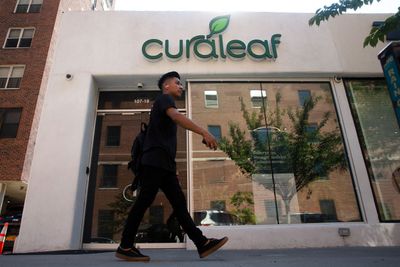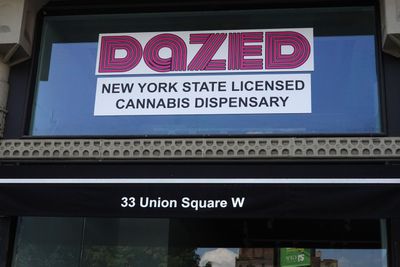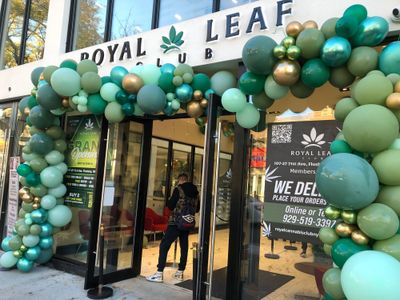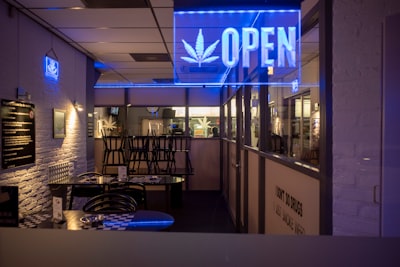Stephon Johnson, The City

This article was originally published on Feb 3 5:00am EST by THE CITY
In the half mile between the city’s only two authorized marijuana retail operations, Housing Works Cannabis Co. and Smacked, 20 other smoke shops are open for business.
On the walk south on Broadway and east on Bleecker between them, THE CITY counted at least 15 of those shops openly selling pot products. It’s a remarkable illustration of how the city’s gray market has flourished as its licensed green market is just beginning to take root in Greenwich Village, where demand from college students — and everyone else — is clearly much greater than the licensed supply.
The smoke shops offer lower prices and, sometimes, more strains. At Housing Works and Smacked, sellers only can offer products grown and made in New York state. They must charge a 13% retail cannabis tax — with 9% going to the state and 4% to NYC — on top of the potency-based tax already paid by distributors.
The result is higher prices for licensed retailers, whose operations have had long lines and products out of stock since opening in the last month. They are offering an eighth of an ounce of marijuana starting at about $45 at Housing Works or $60 at Smacked before taxes, compared to $35 at many smoke shops or as low as $25 from some of the sellers at tables in nearby Washington Square Park.
That weed wild west is chafing some Villagers, visitors, local officials and, of course, licensed sellers, in a new system explicitly intended to steer profits to people and communities who were disproportionately penalized in the course of New York’s long war on the now-legal drug.
/cdn.vox-cdn.com/uploads/chorus_asset/file/24391877/012723_53_village_marijuana.jpg)
“In order for us to have [a] legal cannabis market that focuses on restorative justice and empowers those who have been victimized by mass incarceration and the war on drugs, we need robust enforcement on those operating without a license,” area City Councilmember Erik Bottcher told THE CITY in a text. “Unlicensed cannabis shops also operate without oversight, leading to additional purchases by minors and unregulated products that can be dangerous.”
‘Bad Actors’
Another danger from unlicensed shops is the more than fourfold increase in smoke shop robberies, to 593 in 2022 from 137 in 2021, NYPD Chief of Patrol John Chell testified last month at a City Council hearing, with many of those robberies happening at gunpoint.
That averages out to a robbery for each of nearly one-half the roughly 1,400 smoke shops in New York City, by the NYPD’s count.
Already this year, the Rainbow Smoke Shop on Sixth Avenue between Waverly Place and Eighth Street was robbed at gunpoint by two men who made off with $1,200 in edibles and $600 in cash, the Village Sun reported.
While Mayor Eric Adams’ administration has largely left enforcement to the much smaller sheriff’s office that handles civil law enforcement matters, he promised New Yorkers that his administration will crack down on smoke shops selling weed without licenses.
/cdn.vox-cdn.com/uploads/chorus_asset/file/24389876/012623_adams_sotc_10.jpg)
“We will increase enforcement against unlicensed cannabis shops,” Mayor Adams pledged in his State of the City speech last week. “We are not going to let bad actors undermine the promise we made to New Yorkers who were impacted by marijuana criminalization.”
Unlicensed operations have also been selling to teens, with one smoke shop owner telling THE CITY that the youngest person he’d sold weed to was 15.
“I don’t have kids, but I don’t want my friends to get laced,” the owner said. “They shouldn’t support those shops. I know what my product is and I know where it came from. That kid came in with a previous customer who was about a few years older than him. He looked young and when I asked how old he was, he told me. My product isn’t laced so I felt comfortable selling.”
A recent report from the New York Medical Cannabis Industry Association, in which people bought products at unlicensed shops in New York City that were then tested by a third party, found that 40% were laced with pesticides and heavy metals, with some also containing salmonella, E. coli and lead.
“Beyond these serious health concerns, the negative experience of ingesting these products may exacerbate the harmful stigmas and hesitations that already exist and burdened the legal cannabis industry,” the report warns. “A first-time consumer that may buy these tainted products and be subsequently sickened by them will likely never try cannabis again, even if it’s safe and regulated.”
But Michael, 22, said that he’s not concerned about buying a laced product.
“I don’t think it plays much of a factor,” he told THE CITY while visiting an unlicensed smoke at MacDougal and Bleecker streets to make a purchase.
Cannabis Competition
Past the security guard outside of Smacked checking IDs plus a second guard stationed inside, Desmon Lewis spoke to THE CITY over blaring dancehall music as clerks with iPads took customer orders.
/cdn.vox-cdn.com/uploads/chorus_asset/file/24391872/012723_57_smacked_marijuana.jpg)
Lewis, the new pop-up store’s operations officer, is also a co-founder of the Bronx Community Foundation. That’s one of the groups in the Bronx Cannabis Hub that helped two dozen “justice-involved” applicants, including Smacked owner Roland Cooper, apply for retail dispensary licenses.
Regarding Smacked’s many nearby competitors, Lewis drew a distinction: “Are those unlicensed shops legacy people or are they people being opportunistic?” he asked.
“There’s a role for legacy in the space and making a transition to leave,” presumably by getting a license, Lewis said.
“And those are situations we really want to support. I think it’s unrealistic to shut down all of them, but at the same time sending a message is important. I think it’s a good measure for the mayor to be saying that,” because it means more enforcement is coming, he said.
But a two-minute stroll away, Jay, who works at Village Craft Beer & Smoke II, said that widespread shutdowns are overdue.
“If they want to close it down, in one month, they can close everything. We are a legit business. We have to do everything. We have to pay,” Jay said, pointing to the store’s Tobacco Retail Dealer License taped to the counter.
“They don’t pay anything. That’s not fair. They’re selling weed they’re not supposed to be selling. We don’t sell any of that here. It’s not fair.”
A block or so away, THE CITY asked a worker at a smoke shop selling weed if they had an unfair advantage.
“People gotta eat,” the worker replied.
THE CITY is an independent, nonprofit news outlet dedicated to hard-hitting reporting that serves the people of New York.




